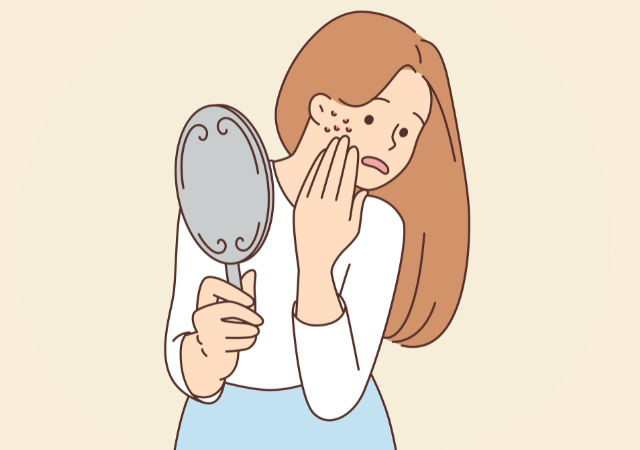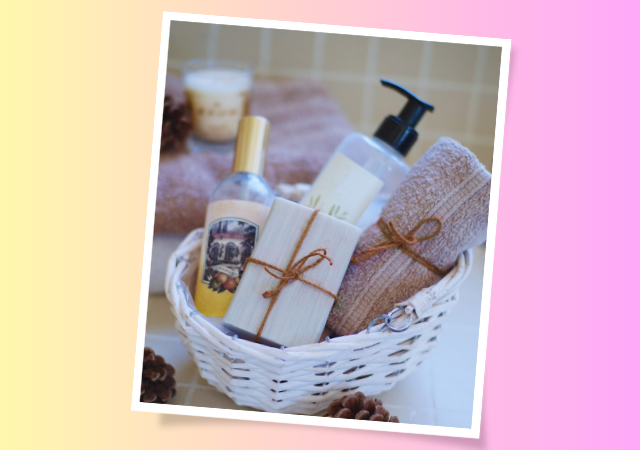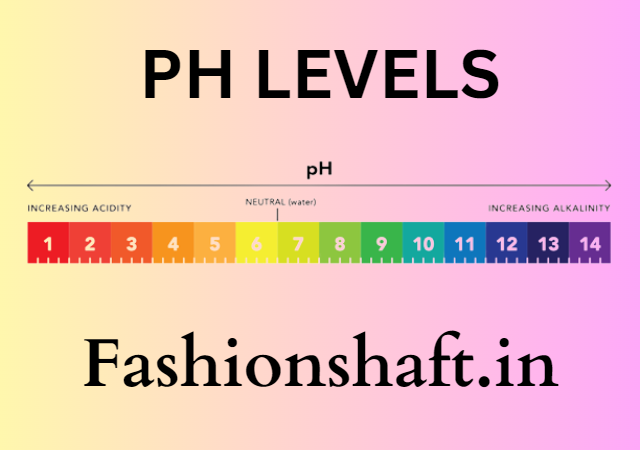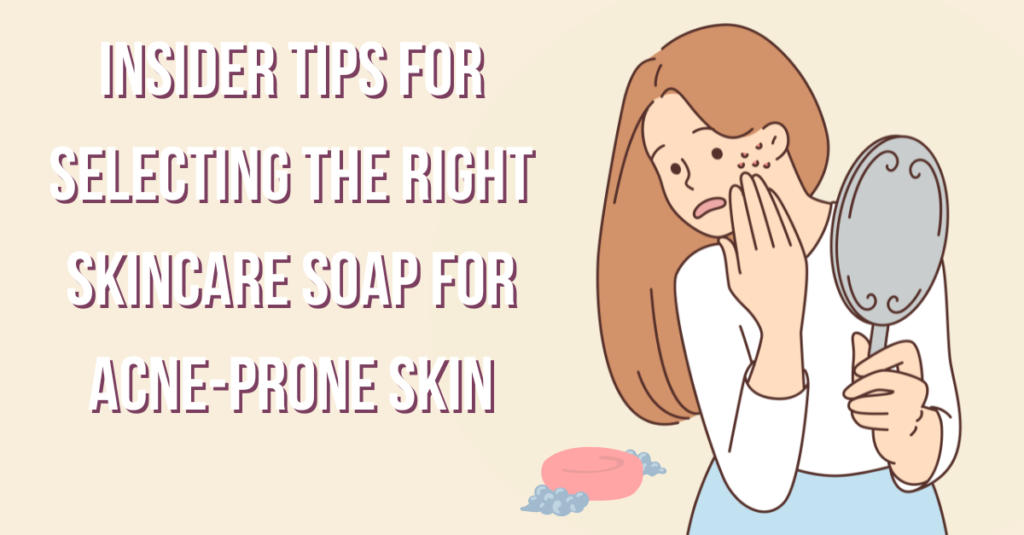Insider Tips for Selecting the Right Skincare Soap for Acne-Prone Skin
Introduction
Understanding Acne-Prone Skin

Before diving into the world of skincare soaps, it’s crucial to grasp the intricacies of acne-prone skin. Acne is often triggered by factors such as excess oil production, clogged pores, and bacterial inflammation. Individuals with acne-prone skin typically experience frequent breakouts, blackheads, and inflammation. Therefore, the right skincare products, including soap, play a pivotal role in managing and preventing acne.
Choosing the Right Ingredients
The first step in selecting an effective soap for acne-prone skin is understanding the ingredients. Certain ingredients can exacerbate acne, while others can help soothe and heal the skin. To avoid potential irritants, steer clear of soaps containing harsh chemicals, artificial fragrances, and dyes. Opt for products labeled as non-comedogenic, meaning they won’t clog pores, and prioritize ingredients known for their acne-fighting properties.
Salicylic acid, a beta-hydroxy acid, is renowned for its ability to penetrate oil-laden pores, exfoliate dead skin cells, and reduce inflammation. Glycolic acid, an alpha-hydroxy acid, is another effective exfoliant that can promote smoother skin texture. Additionally, tea tree oil, with its natural antibacterial and anti-inflammatory properties, can be a beneficial ingredient for acne-prone skin. Look for soaps containing natural extracts like chamomile, aloe vera, or green tea, known for their soothing and anti-inflammatory effects.
Understanding Soap Types

The market offers a variety of soap types, each catering to different skin needs. Understanding the characteristics of each type can help you make an informed decision.
- Gel-based cleansers: Ideal for oily and acne-prone skin, these cleansers are lightweight and effective in removing excess oil and impurities.
- Cream-based cleansers: Suitable for dry or sensitive skin, cream-based cleansers provide hydration while gently cleansing the skin.
- Bar soaps: Traditional bar soaps can be effective for acne-prone skin, especially those containing acne-fighting ingredients. However, some may find them drying.
- Micellar soaps: Formulated with micellar water, these soaps are gentle yet effective in removing impurities without stripping the skin of essential moisture.
- Foaming cleansers: These create a rich lather and are effective for oily skin, helping to remove excess oil and prevent breakouts.
- Oil-based cleansers: Contrary to intuition, oil-based cleansers can be beneficial for acne-prone skin, especially if they contain non-comedogenic oils that help balance oil production.
Choosing the right soap type depends on your skin type and individual needs. If you’re uncertain, experimenting with sample sizes or consulting a dermatologist can guide you toward the most suitable option.
pH Balance Matters

The skin’s natural pH level is slightly acidic, which helps maintain a healthy barrier against bacteria and other external factors. Using a soap that disrupts this pH balance can lead to irritation and potentially worsen acne. Opt for a soap with a pH close to the skin’s natural level (around 4.7 to 5.75). pH-balanced soaps help support the skin’s protective barrier, ensuring it remains resilient against acne-causing factors.
Checking the pH of a soap may require a pH testing strip, but some products explicitly state their pH level on the packaging. Understanding and maintaining the right pH balance can significantly contribute to a healthy complexion for those with acne-prone skin.
Fragrance-Free Options
While a pleasant scent can enhance the skincare experience, fragrances in skincare products can be problematic, especially for sensitive or acne-prone skin. Fragrances may contain allergens or irritants that can exacerbate existing skin issues. Opting for fragrance-free soap reduces the risk of irritation and ensures a gentler approach to skincare.
Fragrance-free options don’t mean sacrificing a pleasant experience. Look for soaps that incorporate natural ingredients for a subtle and non-irritating scent. Essential oils such as lavender or chamomile can provide a calming fragrance without compromising the soap’s suitability for acne-prone skin.
Patch Testing and Allergies
Before incorporating a new skincare soap into your routine, it’s crucial to conduct a patch test. This involves applying a small amount of the product to a discreet area of skin, such as the inner forearm, and monitoring for any adverse reactions. Patch testing helps identify potential allergies or sensitivities, ensuring you avoid unpleasant surprises on your face.
Common allergens in skincare products include fragrances, preservatives, and certain botanical extracts. By patch testing, you can minimize the risk of triggering an allergic reaction and make a more informed decision about the suitability of the soap for your skin.
Checking for Certifications and Labels
Navigating the world of skincare products becomes more manageable when you pay attention to certifications and labels. Look for products that have been dermatologist-tested or carry certifications from reputable organizations. These labels indicate that the product has undergone testing for safety and efficacy, providing assurance of its suitability for sensitive or acne-prone skin.
Additionally, scrutinize ingredient lists on product packaging. Ingredients are usually listed in descending order of concentration, allowing you to identify the primary components of the soap. Familiarizing yourself with common irritants and beneficial ingredients can aid in making informed choices.
Customizing Your Skincare Routine
Selecting the right soap is just one piece of the skincare puzzle. To maximize its effectiveness, integrate it into a comprehensive skincare routine. A well-rounded routine typically includes cleansing, toning, and moisturizing. For acne-prone skin, a targeted approach may involve incorporating additional products such as acne treatments or serums.
When customizing your routine, consider the specific needs of your skin. If you’re combating acne and excess oil, you may choose a soap with salicylic acid and pair it with a non-comedogenic moisturizer. If your skin tends to be dry or sensitive, opt for a gentler soap and a hydrating moisturizer.
Recommendations and Reviews
While individual preferences and skin types vary, seeking recommendations and reading reviews can provide valuable insights. Popular soap brands that cater to acne-prone skin often garner positive reviews from users who have faced similar skincare challenges. Dermatologists can also offer personalized recommendations based on your skin type and concerns.
User testimonials can provide real-world experiences with a particular soap, shedding light on its effectiveness, scent, and overall user satisfaction. Keep in mind that what works for one person may not work for another, so it’s essential to consider a variety of opinions.
Conclusion

My name is Rohit Vagh and I’m a content writer specializing in fashion and lifestyle. I have three years of experience in this field and have written various articles. My writing style is creative and engaging, and I strive to create content that resonates with my readers. I have a deep passion for fashion and am constantly researching the latest trends and styles to make sure my readers are up to date. I’m excited to continue my career in blogging, and I’m always looking for new opportunities in the fashion and lifestyle space.





